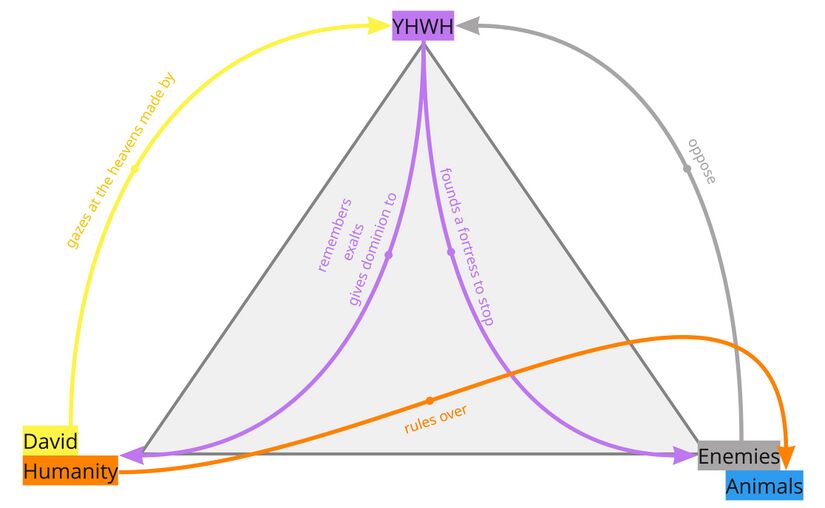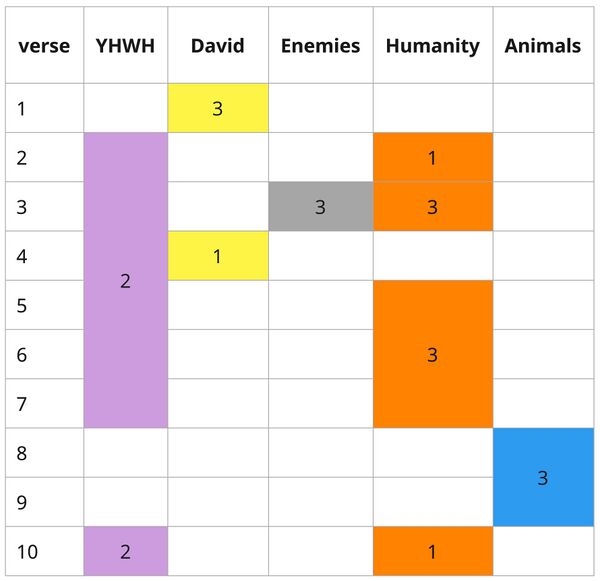Psalm 8 Participant Analysis
From Psalms: Layer by Layer
Psalm 8/Participant Analysis
Choose a PsalmNavigate Psalm 8
Participant Analysis
Participant Analysis focuses on the characters in the psalm and asks, “Who are the main participants (or characters) in this psalm, and what are they saying or doing? It is often helpful for understanding literary structure, speaker identification, etc.
For a detailed explanation of our method, see the Participant Analysis Creator Guidelines.
There are 5 participants/characters in Psalm 8:
Profile List
| David |
| "David" (v. 1) |
| YHWH |
| "YHWH" (vv. 2, 10) |
| "our lord" (vv. 2, 10) |
| Humanity |
| "nursing children" (v. 3) |
| "mankind" (v. 5) |
| "human being" (v. 5) |
| Enemies |
| "adversaries" (v. 3) |
| "vengeful enemy" (v. 3) |
| Animals |
| "sheep" (v. 8) |
| "goats and cattle" (v. 8) |
| "wild animals" (v. 8) |
| "birds" (v. 9) |
| "fish" (v. 9) |
Profile Notes
- David: David, the 10th century king of Israel and Judah, is named in the superscription (v. 1) as the author of the psalm. The fact that the psalm was written by a king is significant. Behind the psalm's reflection on humanity, there is an implicit reflection on David's kingdom and dynasty. David, the shepherd boy and the youngest of his brothers, was an unlikely candidate for the throne (cf. v. 5). Nevertheless, YHWH exalted him and gave him dominion over his enemies (cf. vv. 6–9).
- YHWH:The psalm is addressed to "YHWH" (vv. 2, 10), the God of Israel and the creator and "Lord" of the world. The entire psalm is addressed to YHWH in the second person. "It is worth stressing that throughout the entire poem, the Creator is addressed directly and intimately: your name, you have established, your heavens, you remember them, and so on."[1]
- Nursing children (עוֹלְלִים וְיֹנְקִים) (v. 3) represent the weakest and most vulnerable part of the human race (cf. 1 Sam 15:3; 22:29; Jer 44:7; Lam 1:16; Joel 2:16). They are an image of Israel and her kings, who were completely dependent on YHWH for help. Their best hope was to cry out to him.
- YHWH's enemies (v. 3) may be either "historical persons and nations (Ps 2:1-3) or mythological beings and disruptive cosmic forces (Pss 74:13; 89:10; 93:3)."[2] Those who argue for the latter think that "the enemy and avenger in v. [3]c are best explained as a reference to the foes that God overcomes in the process of creation."[3] Those who argue that the adversaries are human and historical point to the use of the phrase "your adversaries" (צֹרְרֶיךָ) in Ps 74:4 and "vengeful enemy" (אויב ומתנקם) in Ps 44:17 to refer to Israel's enemies[4] along with the fact that "here, as throughout the psalms, the psalmist is fluidly able to identify personal enemies with those hostile to God."[5] This view is probably correct, and the enemies probably refer to the enemies of God's people.
- Animals: Vv. 8-9 lists three basic categories of animals: (1) land animals, domestic and wild (v. 8), (2) birds (v. 9aα), and (3) fish (v. 9aβb). The list of animals in these verses illustrate the "horizontal vector that moves outward from human society: sheep and oxen → beasts of the field → birds → fish → whatever passes the paths of the seas."[6] There is a subtle connection between the "enemies" whom YHWH defeats (v. 3) and the "animals" which YHWH subjugates under humanity's feet (vv. 8–9). Elsewhere, wild animals are used to depict the enemies of God's people (e.g., Pss 7:3; 10:9; 17:12; 22:13, 17, 22; 68:30; 80:14,[7] and the image of being put "under one's feet" evokes the conquest of enemies (cf. Josh 10:24; Ps 110:1). The point of the connection is not to say that animals are somehow morally on par with YHWH's wicked enemies. It is to say, however, that they represent a force of chaos that must be subdued.
| Hebrew | Line | English |
|---|---|---|
| לַמְנַצֵּ֥חַ עַֽל־הַגִּתִּ֗ית מִזְמ֥וֹר לְדָוִֽד׃ | 1 | For the director. On the gittith. A psalm by David. |
| יְהוָ֤ה אֲדֹנֵ֗ינוּ מָֽה־אַדִּ֣יר שִׁ֭מְךָ בְּכָל־הָאָ֑רֶץ | 2a | YHWH, our lord, how majestic is your name in all the earth, |
| אֲשֶׁ֥ר תְּנָ֥ה ה֝וֹדְךָ֗ עַל־הַשָּׁמָֽיִם׃ | 2b | you whose glory is bestowed on the heavens. |
| מִפִּ֤י עֽוֹלְלִ֨ים ׀ וְֽיֹנְקִים֮ יִסַּ֪דְתָּ֫ עֹ֥ז | 3a | Out of the mouths of nursing children, you have founded a fortress, |
| לְמַ֥עַן צוֹרְרֶ֑יךָ | 3b | because of your adversaries, |
| לְהַשְׁבִּ֥ית א֝וֹיֵ֗ב וּמִתְנַקֵּֽם׃ | 3c | in order to put an end to a vengeful enemy. |
| כִּֽי־אֶרְאֶ֣ה שָׁ֭מֶיךָ מַעֲשֵׂ֣י אֶצְבְּעֹתֶ֑יךָ | 4a | When I see your heavens, that which your fingers made, |
| יָרֵ֥חַ וְ֝כוֹכָבִ֗ים אֲשֶׁ֣ר כּוֹנָֽנְתָּה׃ | 4b | moon and stars which you have established, |
| מָֽה־אֱנ֥וֹשׁ כִּֽי־תִזְכְּרֶ֑נּוּ | 5a | what is mankind that you should consider them, |
| וּבֶן־אָ֝דָ֗ם כִּ֣י תִפְקְדֶֽנּוּ׃ | 5b | or a human being, that you should be mindful of him? |
| וַתְּחַסְּרֵ֣הוּ מְּ֭עַט מֵאֱלֹהִ֑ים | 6a | And you caused him to lack being a heavenly being by a little, |
| וְכָב֖וֹד וְהָדָ֣ר תְּעַטְּרֵֽהוּ׃ | 6b | and you crowned him with honor and majesty. |
| תַּ֭מְשִׁילֵהוּ בְּמַעֲשֵׂ֣י יָדֶ֑יךָ | 7a | You caused him to rule that which your hands made. |
| כֹּ֝ל שַׁ֣תָּה תַֽחַת־רַגְלָֽיו׃ | 7b | You placed everything under his feet. |
| צֹנֶ֣ה וַאֲלָפִ֣ים כֻּלָּ֑ם | 8a | Sheep and goats and cattle all of them, |
| וְ֝גַ֗ם בַּהֲמ֥וֹת שָׂדָֽי׃ | 8b | and even wild animals, |
| צִפּ֣וֹר שָׁ֭מַיִם וּדְגֵ֣י הַיָּ֑ם | 9a | birds in the sky and fish in the sea, |
| עֹ֝בֵ֗ר אָרְח֥וֹת יַמִּֽים׃ | 9b | that which traverses the paths of the sea. |
| יְהוָ֥ה אֲדֹנֵ֑ינוּ מָֽה־אַדִּ֥יר שִׁ֝מְךָ֗ בְּכָל־הָאָֽרֶץ׃ | 10 | YHWH, our lord, how majestic is your name in all the earth. |
Participant Relations Diagram
The relationships among the participants may be abstracted and summarized as follows:




